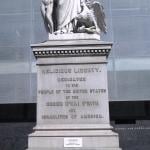
All of us need time with others, time with our community, but also time to be alone. We need times of rest and relaxation, sometimes with friends and family, but at other times, all by ourselves. Sometimes, we need to cut off all chatter, both the chatter which comes from others, but also the chatter which comes from within our minds, and it is easier to do so if we go on some form of retreat. We need the time for silence. For, in that silence, if we are open to it, we can begin to experience, in a new way, our relationship with God (and the world around us). And, if we pay careful attention, we might find God will come to us as a still small voice in that silence, a voice which speaks to us, speaks to our inner being, without need of words. Hopefully we will come out of the experience with some new apprehension of God, and with grace which will help us grow us a person. Then, we can return to the world at large, to our community, not only rejuvenated, but better than before, allowing us to become a better member of society. Jesus, in his humanity, needed this as much as the rest of us; he was full of love, sharing himself with those who came to him, but also he needed times of rest, times in which he went on a silent retreat where he then engaged his relationship with God the Father:
And after he had dismissed the crowds, he went up on the mountain by himself to pray. When evening came, he was there alone, but the boat by this time was many furlongs distant from the land, beaten by the waves; for the wind was against them (Matt. 14:23-24 RSV).
Jesus, as always, led by example. He showed us what it is to be human. Of course, we will not be able to do everything he did. We are not expected to do so. What he does is give us an example of what it is to be authentically human person, what it is like to be pure and without sin. He shows us we are to love others, but also, we should still be concerned with our own personal needs, and in those needs, we need to find time to be with God, to commune with God without any other distraction getting in the way. To be sure, Jesus was always communing with God due to the hypostatic union; however, he also lived out the human experience, doing things the way we can and should do things, which is why he fulfilled the law and engaged the religious rites of his Jewish heritage. When we see him going on silent retreats, even right before his ministry began, he shows us that we, too, will have times in which it is best for us to get away from it all, away from others, and revitalize ourselves in a silent retreat. Such solitude, however, must be understood properly: “Solitude is more than being alone and separated from other persons. Silence is more than not speaking.”[1] Silence is a way of detachment; we are to put aside all earthly cares, all things external to us, so that we can make room for God to act in and with us. Once we have done so, we might even find God draws us to speak:
We pray in our room when we withdraw our hearts completely from the clatter of every thought and concern and disclose our prayers to the Lord in secret and, as it were, intimately. We pray with the door shut when, with closed lips and in total silence, we pray to the searcher not of voices but of hearts. We pray in secret when, intent in heart and mind alone, we offer our petitions to God alone, so that even the adversary powers cannot discover the nature of our petition. [2]
We must detach ourselves from everything which hinders our growth, everything which hinders our relationship with God or with our neighbor, that is, everything which hinders our ability to love and to be loved. When we do so, we must be put it, as it were, into the fire, into the fiery love of God, so that we can be refined our love may be made pure:
For no other foundation can any one lay than that which is laid, which is Jesus Christ. Now if any one builds on the foundation with gold, silver, precious stones, wood, hay, straw — each man’s work will become manifest; for the Day will disclose it, because it will be revealed with fire, and the fire will test what sort of work each one has done. If the work which any man has built on the foundation survives, he will receive a reward. If any man’s work is burned up, he will suffer loss, though he himself will be saved, but only as through fire (1 Cor. 3:11-15 RSV).
While what Paul says here is eschatological in nature, telling us of the purification which we will all experience in the eschaton, we must remember that the eschaton became immanent with the incarnation. We can participate in it even now. What the West calls purgatory begins while we are alive, not when we are dead. Those who embrace it can find themselves being changed and made for the better. Engaging God in silence gives us one way to embrace God’s love, and with it, with the detachment we engage, we can see God’s grace taking the opportunity to purify us in the process. Of course, we can experience other results with our silent retreats: hopefully we will find ourselves attaining some level of peace, some of the joy of the kingdom of God as well. If so, we will find the peace which we need to overcome the disturbing winds of chance and the waves of inordinate desires which flow through us. We will find ourselves pacified, so that, once we have found ourselves at peace, we can go back into the world, strengthened and refreshed, ready to engage others with a renewed spirit, ready to love them as we should.
[1] George Maloney, SJ, Prayer of the Heart (Notre Dame, IN: Ave Maria Press, 1981), 47.
[2] John Cassian, The Conferences. Trans. Boniface Ramsey, OP (New York: Newman Press, 1997), 353 [Ninth Conference; Abba Isaac].
Stay in touch! Like A Little Bit of Nothing on Facebook.
If you liked what you read, please consider sharing it with your friends and family!
N.B.: While I read comments to moderate them, I rarely respond to them. If I don’t respond to your comment directly, don’t assume I am unthankful for it. I appreciate it. But I want readers to feel free to ask questions, and hopefully, dialogue with each other. I have shared what I wanted to say, though some responses will get a brief reply by me, or, if I find it interesting and something I can engage fully, as the foundation for another post. I have had many posts inspired or improved upon thanks to my readers.













